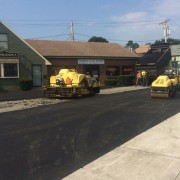What Causes Driveway Cracks?
Cracks in a driveway are an inevitable part of being a homeowner. They typically begin to crack when the material breaks down and separates. Finding cracks in a newer driveway can be infuriating, but understanding why they occur can help you to prevent and correct them.
Asphalt vs. Concrete Driveways
Asphalt and concrete are the most popular types of materials used for driveways in the United States and both can crack for the same reasons. Because driveways made from asphalt are usually set up as a long surface, they can crack more easily. Concrete driveways won’t crack as easily because they have controlled joints spread throughout. Regardless of the material you use for your driveway, large cracks should not occur for several years.
Poorly Installed Driveway Base
One of the most common reasons for cracks in your driveway is poor installation. This is usually from an incorrect construction of the base or subbase. Because of this, it’s important to find a highly ranked paving company. Good paving contractors will construct a driveway subbase from crush stone, ensure it’s packed tight, install an aggregate base then pour concrete or asphalt over it.
Lose the Salt When Melting Ice
For some surfaces, salt is great for increasing traction, but it can do some serious damage on asphalt and concrete. When you spread salt on your driveway, it is speeding up the process of thawing, causing water to make its way into the surface. Here, it will refreeze, put pressure on the driveway and cause it to crack. To prevent cracks in the winter, try spreading sand. Sand will give your vehicle the traction it needs, but won’t cause the snow to melt and result in a crack.
Control Tree Roots
Much like melting snow, growing tree roots can create pressure on your driveway. As roots of trees grown, irregular amounts of pressure are put on the driveway and foundation, causing it to crack. When installing a new driveway, take into consideration the placement of your trees.
The best way to prevent driveway cracks is by hiring the right paving company for a residential installation. For more information or to request a quote, contact Driveway Specialists today! We can be reached by filling out our online contact form or by calling (844) 244-4249

